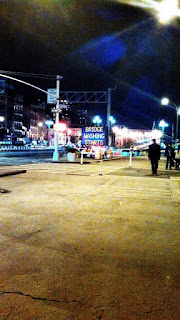I am usually awash with existential angst as my birthday approaches. As my friend, Amanda, celebrates another year of her life, Halloween comes and goes, and campaign pamphlets come out in full force, I begin to tremble at the thought of the impending moment in which an essential part of my identity changes, by 1. I question my life choices, reconsider my priorities, and kick myself for not yet having written a book (or gone to the moon).
This year, however, I have been consumed with the laws of torts and the procedures of civil law and the complimentary beverages at weekly Bar Review; I have not been able to question the foundations of my entire life. Without realizing it, I'm suddenly about a week out, and so, while eating Thai leftovers for breakfast, texting my mom intermittently, I decided to write this instead of researching for my paper.
Last night, as Vin and I tried a new Thai restaurant in the East Village, I thought about how kind to me was this year. While I cried a lot, threw tantrums, was in pain, I also laughed a lot, saw the fruits of a laborious 2012, and fell in love. My 25th year may have begun with exhaustion and a confused soliloquy, and my 26th year may easily begin with the same fatigue, the same uncertain song; but, for once, I'm not cringing at the thought of losing one more year of my life. Rather, I close my eyes and smile to myself, thinking only about the many simple moments and special people who made this one of the best years of my life. And as I was reflecting silently on my year at Ngam, Vin smiled at me, dimples and all.
Giddy, I got up to use the restroom, my mind and heart still in the clouds, thinking about sangria and concerts and coconut chutney. Vin was walking ahead of me.
And that's when I realized my skirt had fallen down. The blissful year filled with new love and falafel carts and sangria dates led to an explosion of my skirt, and my zipper caved under the pressure, and permitted my clothing to, just, fall.
I had walked through the entire restaurant before realizing what had happened. The creepy smile I had on my face quickly became a desperate, awkward slant, my thoughts of love soon dispelled and replaced by an urgency. I pushed Vin. "Move! Hurry up!"
And as I pushed him out of my way and ran towards the bathroom, I turned, and met the gaze of several bewildered customers, all of whom had paid for dinner without realizing there was also a show.
We paid soon after that and walked out. I guess nothing will really change when I turn 25, or 26 or 27 or 58. Sometimes, you have good days, and sometimes, you're rendered pantsless.
As we left the restaurant, Vin turned to me and said, "Oh god, my fly was open as we walked out."
And then there are the days it doesn't matter either way, as long as you have someone willing to publicly shame himself, too.
This year, however, I have been consumed with the laws of torts and the procedures of civil law and the complimentary beverages at weekly Bar Review; I have not been able to question the foundations of my entire life. Without realizing it, I'm suddenly about a week out, and so, while eating Thai leftovers for breakfast, texting my mom intermittently, I decided to write this instead of researching for my paper.
Last night, as Vin and I tried a new Thai restaurant in the East Village, I thought about how kind to me was this year. While I cried a lot, threw tantrums, was in pain, I also laughed a lot, saw the fruits of a laborious 2012, and fell in love. My 25th year may have begun with exhaustion and a confused soliloquy, and my 26th year may easily begin with the same fatigue, the same uncertain song; but, for once, I'm not cringing at the thought of losing one more year of my life. Rather, I close my eyes and smile to myself, thinking only about the many simple moments and special people who made this one of the best years of my life. And as I was reflecting silently on my year at Ngam, Vin smiled at me, dimples and all.
Giddy, I got up to use the restroom, my mind and heart still in the clouds, thinking about sangria and concerts and coconut chutney. Vin was walking ahead of me.
And that's when I realized my skirt had fallen down. The blissful year filled with new love and falafel carts and sangria dates led to an explosion of my skirt, and my zipper caved under the pressure, and permitted my clothing to, just, fall.
I had walked through the entire restaurant before realizing what had happened. The creepy smile I had on my face quickly became a desperate, awkward slant, my thoughts of love soon dispelled and replaced by an urgency. I pushed Vin. "Move! Hurry up!"
And as I pushed him out of my way and ran towards the bathroom, I turned, and met the gaze of several bewildered customers, all of whom had paid for dinner without realizing there was also a show.
We paid soon after that and walked out. I guess nothing will really change when I turn 25, or 26 or 27 or 58. Sometimes, you have good days, and sometimes, you're rendered pantsless.
As we left the restaurant, Vin turned to me and said, "Oh god, my fly was open as we walked out."
And then there are the days it doesn't matter either way, as long as you have someone willing to publicly shame himself, too.
























